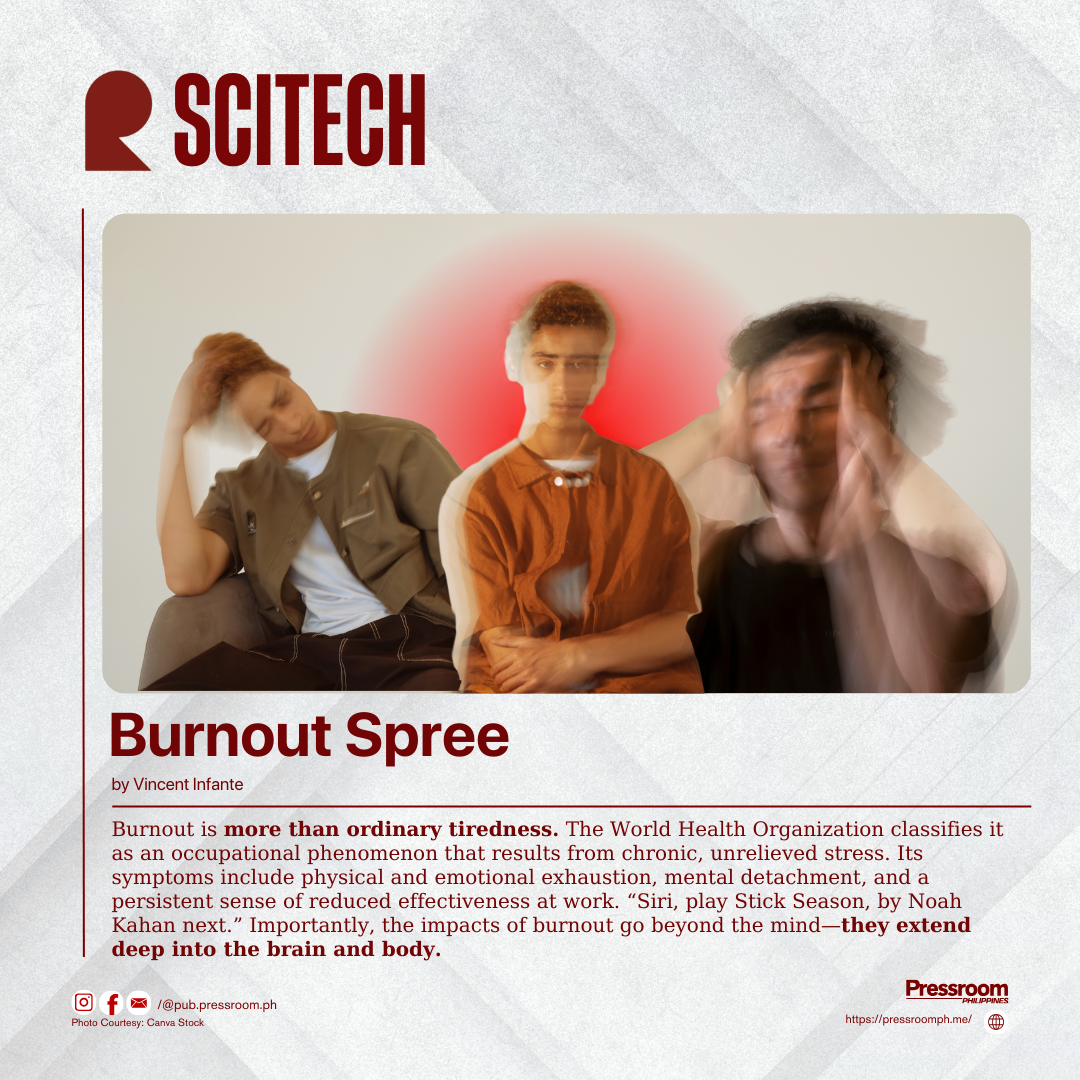It was a long day. You feel okay but not quite okay. You’re not sad or happy—just empty. Even when doing things you love, everything feels draining. As you lie in bed, you whisper, “Siri, play This Is Me Trying, by Taylor Swift.” Surprisingly relatable, right? This is the science behind every burnout spree.
Burnout is more than ordinary tiredness. The World Health Organization classifies it as an occupational phenomenon that results from chronic, unrelieved stress. Its symptoms include physical and emotional exhaustion, mental detachment, and a persistent sense of reduced effectiveness at work. “Siri, play Stick Season, by Noah Kahan next.” Importantly, the impacts of burnout go beyond the mind—they extend deep into the brain and body.
In the brain, stress activates the hypothalamic–pituitary–adrenal (HPA) axis, triggering cortisol release. While cortisol helps us respond to short-term stress, chronic activation disrupts normal brain functioning. “Siri, please play You’re On Your Own, Kid, by Taylor Swift after it, please.” The prefrontal cortex, which governs focus and decision-making, can lose efficiency and even volume, making it harder to concentrate and plan.
At the same time, the amygdala, the brain’s emotional alarm center, becomes overactive, leading to irritability and anxiety. “Siri, play Cardigan, by Taylor Swift, immediately.” The hippocampus, essential for memory and learning, can shrink with long-term stress, contributing to forgetfulness and mental fog. Neurotransmitters like dopamine and serotonin, which regulate motivation and mood, may also decline, leaving a person drained of drive and joy.
The body does not escape the damage. Chronic stress weakens the immune system and increases inflammation, raising the risk of cardiovascular disease, gastrointestinal problems, and metabolic disorders. “Siri, play Somewhere We Only Knew, by Keane, and shuffle it.” The balance between the sympathetic system, which drives fight-or-flight, and the parasympathetic system, which restores calm, becomes disrupted.
This keeps the body in a state of constant tension, with elevated blood pressure and greater wear and tear. Researchers have also linked chronic burnout to signs of accelerated biological aging, such as higher allostatic load and shorter telomeres, the protective caps of our DNA, though the relationship is complex and not fully understood. “Siri, play Someone to Stay, by Vancouver Sleep Clinic next.”
Psychologically, burnout is described through three dimensions: emotional exhaustion, cynicism or detachment, and a sense of inefficacy. “Siri, please play Are You Satisfied, by Marina, and shuffle it.” It often strikes people who are very passionate about their work because they push themselves too hard without proper recovery.
Burnout is not a sign of weakness but a warning signal. It shows that the body and mind are being pushed past their limits. Like an engine that overheats, ignoring the signs only causes more damage. “Siri, please play Fine Line, by Harry Styles, to ease it up.” Rest and recovery are not luxuries but biological necessities, because no one can continue giving their best when they are already running on empty.
In a world often so judgmental, it doesn’t take rocket science to understand that you’re not a superhero; the strongest thing you can do is admit you’re not ok and ask for a helping hand. For those silent battles you fought, you owe yourself more kindness than you deserve in this world. Sometimes, it’s just time for you to sit back, relax, and rest. So in order to fix this burnout spree, all you need is to preserve your sanity, guided by God’s divinity. There will always be clarity behind uncertainty. “Siri, finally please play Safe, by Victory Worship and Isa Fabregas.”






